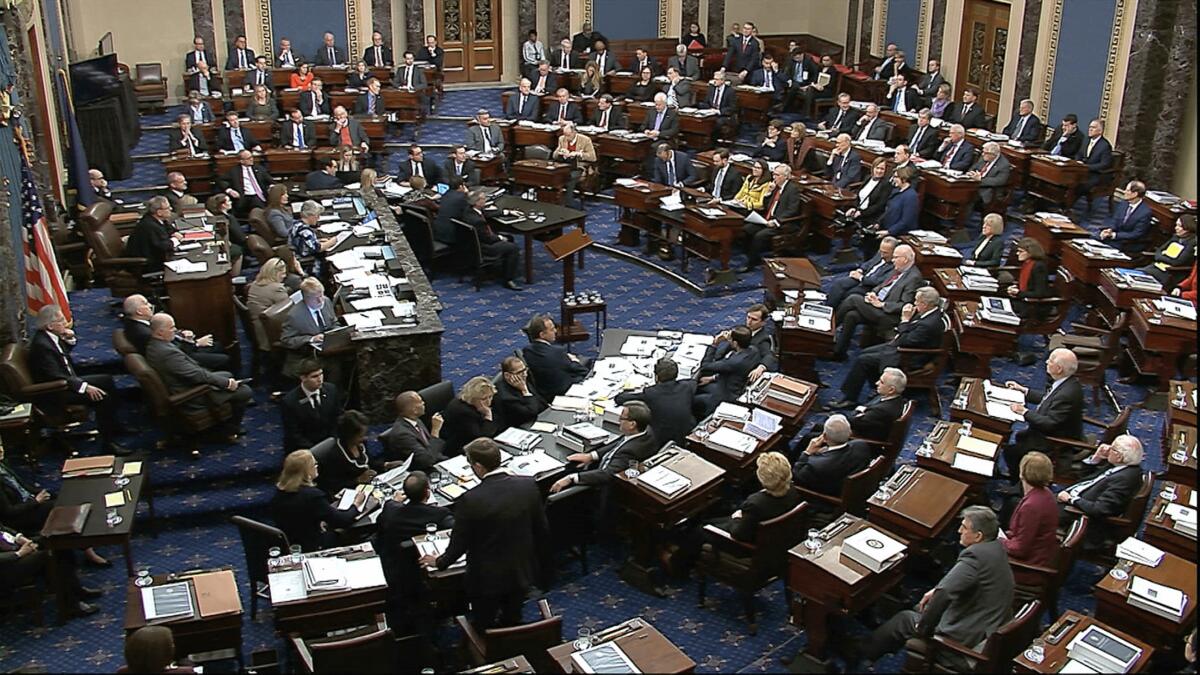Column: America’s democracy seems to need radical changes. But what are the chances, really?

- Share via
Recently a White House commission heard testimony on a controversial proposal to strip the U.S. Supreme Court of its power to rule on the constitutionality of American laws. The court has grown too powerful and undemocratic, several witnesses said.
A few weeks later, a legal scholar wrote that it was time to lengthen the ludicrously short two-year terms that members of the House of Representatives serve under the Constitution. Little can get done, he wrote, in an atmosphere of perpetual campaigning.
Around the country, there are conversations underway about how the U.S. Senate could be restructured so that it doesn’t allot the same number of senators — two — to a state like Wyoming, which has fewer than 600,000 people, as it does to California, which has nearly 40 million people. The current system leaves millions of Americans grossly underrepresented.
There’s also talk of doing away with the electoral college, of banning corporate money from politics, of breaking up the biggest states (Los Angeles County could become the country’s eighth-largest state!), of depoliticizing redistricting and of allowing noncitizens to vote.
Many of the proposals are old ones, long backed by frustrated academics and head-in-the-clouds idealists, but in my circles at least, I hear a new sense of urgency for radical, structural change in the government.
Is it any surprise?
The country is in the grips of crisis, stuck, incapable of moving forward. Presidents can’t fulfill their agendas. Congress can’t agree on legislation. The Supreme Court is deeply politicized. We’re still reeling from four years under President Trump, who trampled on democracy and its rules. Bipartisanship is passé.
Problems as serious as the climate crisis, economic inequality and racial injustice, and problems as simple and uncontroversial as rebuilding crumbling infrastructure and covering our national debts, seem insuperable in the face of partisanship and enmity.
It’s no wonder Americans are eager to reinvent or reinvigorate democracy.
I’d like to tell you that change is coming. Many of the proposals, after all, would improve our lot. The electoral college is an anachronism — of course the presidency should go to the candidate who wins the most votes. The structure of the Senate is a glaring violation of the principle of one-person, one-vote; the result of a deal from 1787 that badly needs reassessment.
But ironically, at a time when people are willing to consider big changes, big changes may be more distant than ever.
Truly substantive reforms — eliminating the electoral college or remaking the Senate, for instance, or undoing the Citizens United decision — would require amending the U.S. Constitution.
Well, great, you might think — that’s why we have an amendment process, to keep the 234-year-old Constitution up to date with the modern world. Let’s get started.
But don’t get overexcited. In the 50 years since 1971, only one constitutional amendment has been approved, a relatively insignificant one about when congressional pay changes can go into effect. The amendment before that — extending the vote to 18-year-olds — could never succeed in today’s partisan environment because it would be likely to benefit one party over the other.
More than 11,000 amendments have been proposed since 1789, but only 27 have been enacted.
Why so few? Because they’re extremely hard to pass. Too hard. To succeed, a constitutional amendment is usually proposed by a vote of two-thirds of both houses of Congress. After that it must be ratified by three-quarters of the states (currently, 38 of them). That’s right — a double supermajority.
Good luck with that in this political climate. One critic recently went so far as to question whether the U.S. would ever pass a constitutional amendment again, quoting Aziz Rana, a constitutional law professor at Cornell University, saying: “We have an amendment process that’s the hardest in the world to enact.”
And if you want to change that amendment process? That requires an amendment.
Even legislative change that could be accomplished by Congress alone — for instance, rewriting the Voting Rights Act, which was gutted by the Supreme Court in 2013 — is virtually impossible in the polarized mess of present-day Washington.
That’s why so many Democrats are focused on eliminating the filibuster, which makes it impossible to pass most legislation without a 60-vote supermajority in the 100-member Senate. Because the filibuster is a Senate rule, it could be abolished relatively easily through procedural maneuvering.
Theoretically.
But not all Democrats agree on doing away with the filibuster, so even finding a majority to do so could be difficult.
Eliminating the filibuster is the kind of change that seems like a great idea when — as is now the case for Democrats — your party is in power but is not strong enough to surmount the 60-vote threshold. But if you get rid of it, you must be prepared for the consequences when your party loses its majority (which could easily happen to Democrats in the Senate next year). You might come to regret the change.
Many of us were brought up on American exceptionalism and post-World War II braggadocio. It was common to hear the U.S. called the greatest country in the world, and for children to be taught that our Constitution was the most democratic and progressive there was.
That self-image has been badly battered recently.
For a society to remain healthy, responsive to its citizens and truly democratic, it needs to be able to change. And that doesn’t happen easily in the United States.
Nevertheless, what choice do we have other than to keep trying, to vote our consciences, to protest peacefully and to speak out in favor of substantive democratic reform?
The alternative is more of the same.
More to Read
A cure for the common opinion
Get thought-provoking perspectives with our weekly newsletter.
You may occasionally receive promotional content from the Los Angeles Times.











